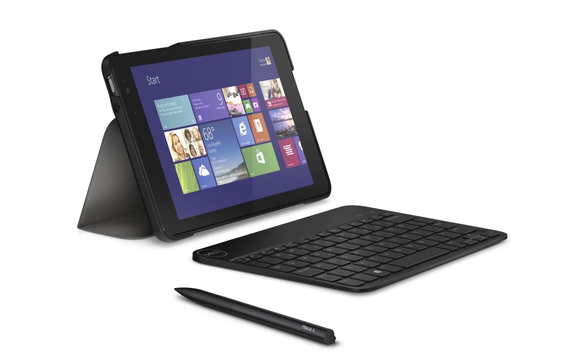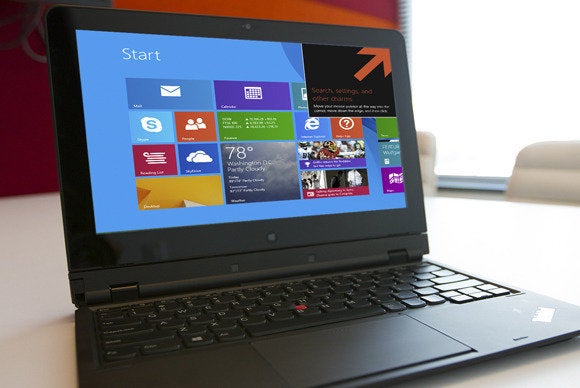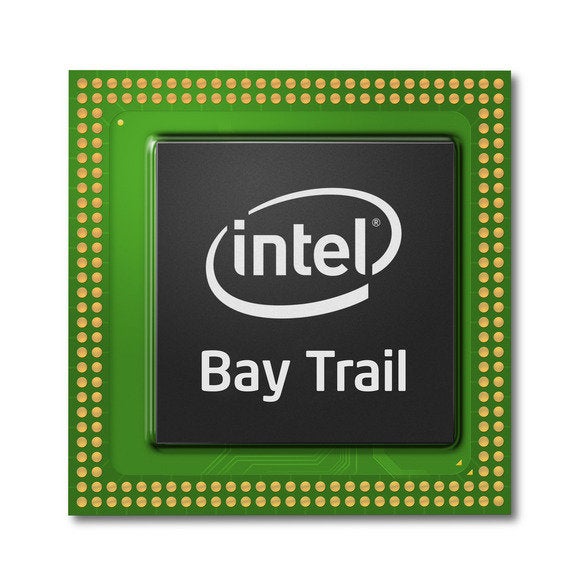
Tablets running a 64-bit version of Windows 8.1 on top of Intel’s 64-bit Atom processor, Bay Trail, are set to debut at Mobile World Congress in Barcelona later this month. They’ll be among the first horses out of the gate in a larger race to move the entire tablet ecosystem—hardware and software—to the new technology.
The field—made up of Microsoft, Google, Intel, ARM, AMD, Apple, and a host of software developers—are all rushing toward a more robust 64-bit environment, with the goal of future-proofing tablet performance. In general, that means giving them the potential to address memory beyond 4GB of RAM, and also providing consistency with other 64-bit applications that already exist on the PC.

64-bit Windows, 64-bit Atom: smooth sailing?
Most, if not all, of the existing Windows tablet makers are expected to begin shifting over to 64-bit technology. “One of the usual suspects,” said our source, will be showing off a 64-bit Bay Trail tablet in Barcelona. The vendor is most likely Dell. Without specifically commenting, a Dell representative said that the company would be offering a 64-bit OS on the Venue 8 Pro and 11 Pro tablets later this year.“This is important for our commercial customers because many applications have been built on existing client hardware, which is predominantly 64-bit,” the Dell representative continued. “So it will provide a richer user experience for customers.”
The Bay Trail Atom chip (also known as the Atom Z3680) is Intel’s first 64-bit system-on-a-chip. Given that the Atom chips are compatible with Intel’s existing Core lineup, the Windows-on-Atom transition should go fairly smoothly, sources expect.

The shift didn’t happen overnight. Microsoft’s Office 2010, for example, installed a 32-bit version by default even if your PC used a 64-bit chip. It was an attempt to cut down or eliminate software incompatibilities. But, in general, Windows apps that need to be 64-bit have already been re-coded for 64-bit technology.
“Windows 8.1 runs great on 64-bit,” a Microsoft representative said in a statement. “There are a number of great Windows 8.1 devices running 64-bit on Intel chips out now such as Dell’s Venue Pro 11, XPS12, Acer Aspire, Surface Pro 2. In the coming months, there will be Windows 8.1 devices running 64 bit on Atom."
The real prize: 64-bit Android
But enough about Wintel: Android is far more important going forward. According to IDC, Windows tablets of all stripes accounted for just 3 percent of all of the tablets shipped during 2013. That includes a significant uptick in Surface shipments alone during the fourth quarter. But that's nothing compared to the 60.8 percent unit market share enjoyed by Android tablets this year.Intel definitely recognizes the difference between the market potential of both platforms, and the company has made it very clear that Bay Trail-based tablets will run both operating systems. “Intel is pursuing aggressively both Android tablets and Windows tablets—they made a statement to that effect at their financial analyst meeting, and as far as I know they’re sticking with it,” Brookwood said.

Until Samsung and Qualcomm can begin shipping their own 64-bit ARM chips, Intel, AMD and Apple are the only chip vendors with 64-bit tablet silicon. (AMD’s 2014 mobile roadmap is based upon two processors named “Beema” and “Mullins,", but AMD says their first 64-bit tablet chip was Temash.) Qualcomm announced the 64-bit Snapdragon 410 in December, saying it would sample during the first half of 2014 and ship in commercial devices in the second half, for sub-$150 smartphones. So far, however, Qualcomm’s MWC teaser page seems to indicate that Qualcomm will concentrate attention on the company’s wireless technologies.
Intel is expected to use Mobile World Congress to shed further light on 64-bit Android and the Merrifield chip, a 22-nm version of the Atom targeted at high-end smartphones. Intel first showed off the Merrifield chip powering a prototype smartphone last summer. However, smartphone OEMs have been reluctant to use Intel’s Atom chips because of the lack of an integrated LTE radio, which can save a smartphone maker cost and board space. Intel may also begin talking about its next chip for the smartphone market, code-named Moorefield.
Where is Google in all this?
In the case of 64-bit Android platforms, some of the silicon appears to be outpacing the hardware. Intel, not Google, completed work on a 64-bit version of the Android 4.4 OS for x86 smartphones in January. Intel is expected to talk about the technology at MWC in conjunction with Merrifield.Ars Technica has been tracking the flow of 64-bit commits into the source code repository, github, as well as the Android Open Source Project, which Google tends to enrich after it releases a new version of its Android OS. The publication guesses that 64-bit Android will become a mainstay at the end of 2015, when both a 64-bit version is released, and major applications begin to take advantage of the new features.

Intel’s answer, which reportedly it will detail further at MWC, is Intel Device Protection, the technology that chief executive Brian Krzanich introduced during his keynote speech at CES. The problem is that IDP will protect only Intel-powered devices running Android, most likely using the Identity Protection Technology built into its Bay Trail processors.

Google, naturally, has remained mum on its plans. As the other pieces of the 64-bit puzzle fall into place, however, pressure will certainly increase on Google to move forward. The 64-bit transition in the tablet market may be neither sharp nor dramatic, but it will happen—and with significant implications for developers and users, as mobile devices capture more and more of our computing lives.
Correction: According to AMD, an earlier chip designed for the tablet market, Temash, was based on a 64-bit architecture.

ليست هناك تعليقات:
إرسال تعليق